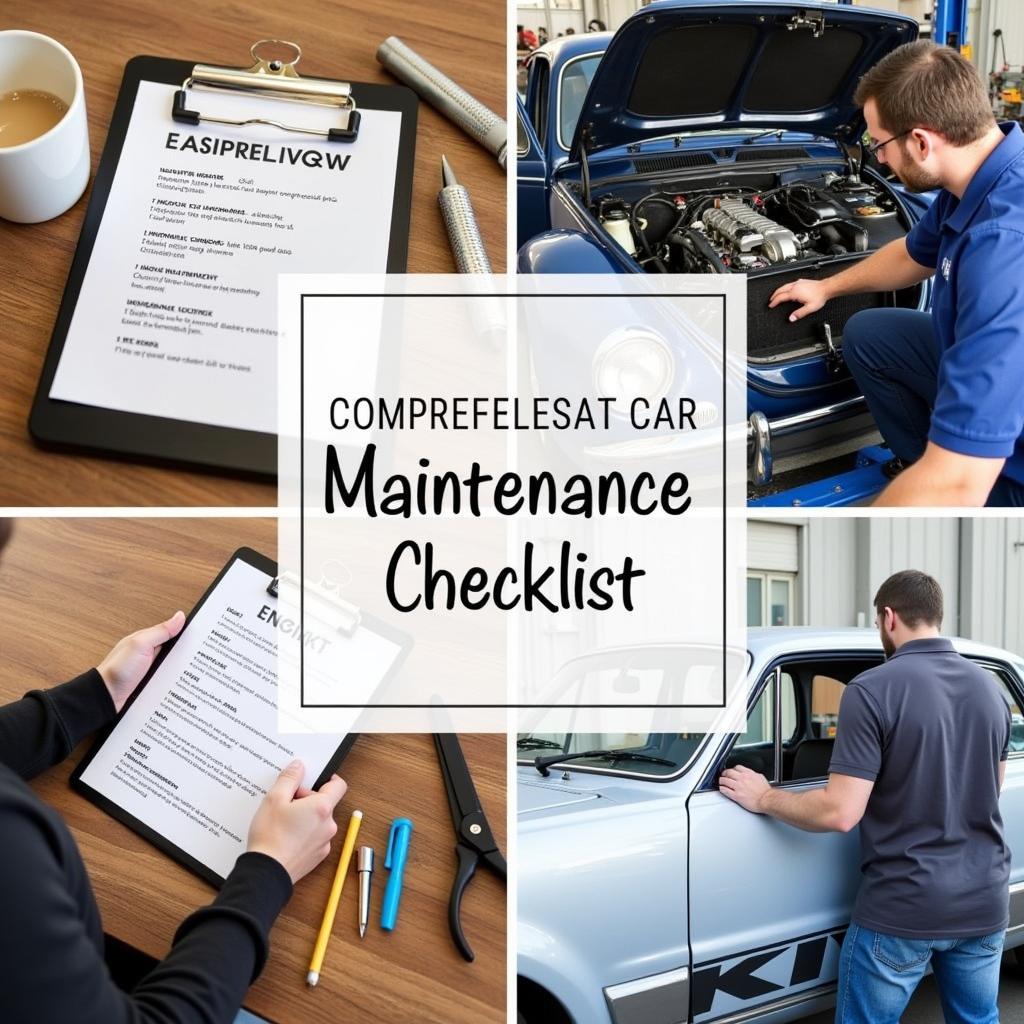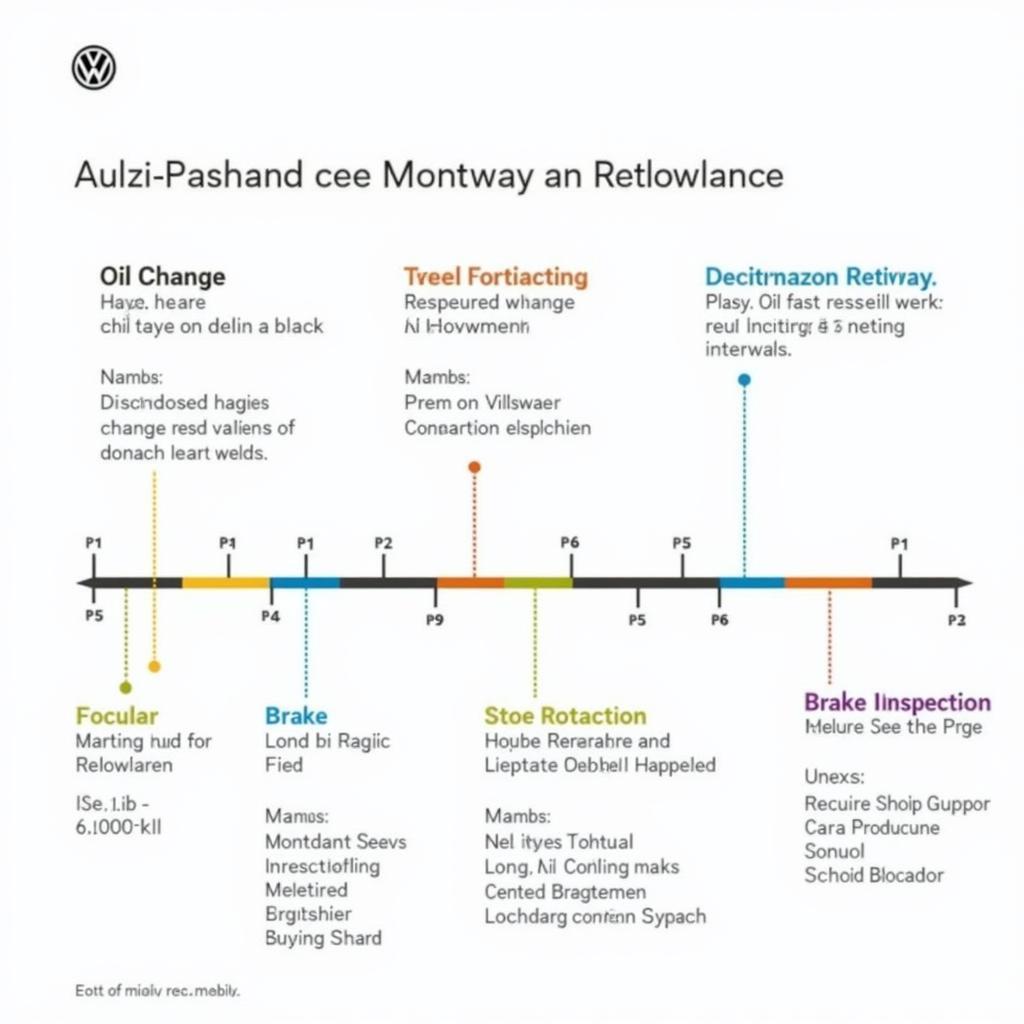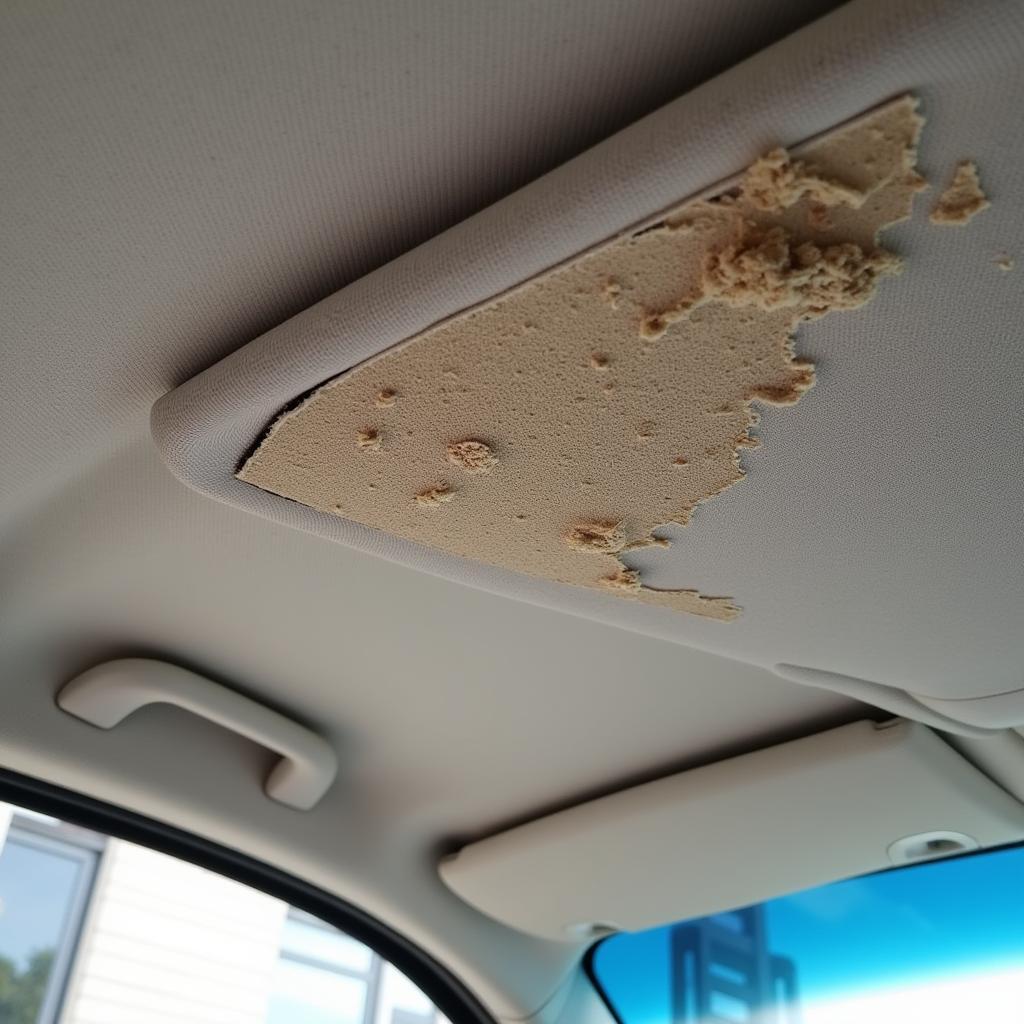Owning a Volkswagen comes with a sense of pride and a reputation for German engineering excellence. However, even the most well-built vehicles require regular maintenance to perform at their best. Understanding and adhering to a Vw Car Maintenance Schedule isn’t just about ticking boxes – it’s about maximizing your car’s lifespan, ensuring your safety, and enjoying a smoother ride for miles to come.
 Volkswagen Car Maintenance Checklist
Volkswagen Car Maintenance Checklist
Why is a VW Car Maintenance Schedule Important?
Imagine this: you’re cruising down the highway, enjoying the open road, when suddenly, your engine sputters and stalls. This nightmare scenario can often be avoided with a proper VW car maintenance plan. Regular maintenance:
- Prevents Costly Repairs: Identifying minor issues early prevents them from escalating into major (and expensive) problems down the line.
- Increases Safety: A well-maintained car is a safer car. Regular checks ensure brakes, tires, and other vital components are in optimal condition.
- Improves Fuel Efficiency: A well-tuned engine runs more efficiently, saving you money on fuel costs and reducing your carbon footprint.
- Maintains Value: When it comes time to sell or trade-in, a car with a documented maintenance history will command a higher value.
Decoding Your VW Car Maintenance Schedule
Your Volkswagen comes with a manufacturer-recommended maintenance schedule, conveniently outlined in your owner’s manual. This schedule outlines specific service intervals based on mileage or time, whichever comes first.
 Understanding VW Car Maintenance Intervals
Understanding VW Car Maintenance Intervals
Typical Maintenance Intervals:
- Every 5,000-7,500 miles: Oil and filter change, tire rotation, brake inspection
- Every 10,000-15,000 miles: Air filter replacement, cabin air filter replacement, spark plug replacement (depending on model)
- Every 30,000-60,000 miles: Coolant flush, transmission fluid flush (automatic transmissions), serpentine belt inspection
- Every 100,000 miles: Timing belt replacement (interference engines), fuel system cleaning
“Following your VW’s maintenance schedule isn’t just about keeping it running—it’s about investing in its longevity,” says master technician, Hans Schmidt. “Regular service can significantly extend the life of your engine and other crucial components.”
Essential Maintenance Tasks Explained
While your owner’s manual provides a comprehensive list, understanding these key maintenance tasks can empower you as a car owner:
-
Oil Change: The lifeblood of your engine, regular oil changes ensure smooth operation and prevent premature wear and tear.
-
Filter Replacements: Engine air filters, cabin air filters, and fuel filters all play a role in keeping your engine running smoothly and the air you breathe clean.
-
Tire Rotation and Pressure Checks: Rotating tires ensures even wear and extends their lifespan. Maintaining correct tire pressure improves handling, fuel economy, and safety.
-
Brake Inspections: Brakes are your car’s most important safety feature. Regular inspections, pad replacements, and fluid flushes are essential.
-
Fluid Flushes: Engine coolant, transmission fluid, and brake fluid all degrade over time. Regular flushes ensure these fluids continue to perform optimally.
Beyond the Basics: Additional Maintenance Tips
- Pay Attention to Warning Lights: Your dashboard warning lights are there for a reason. Ignoring them can lead to further damage.
- Listen to Your Car: Unusual noises, vibrations, or smells are all signs something might be wrong. Get it checked by a professional sooner rather than later.
- Choose Quality Parts: When replacing parts, opt for high-quality OEM (Original Equipment Manufacturer) or reputable aftermarket brands.
 VW Car Undergoing Maintenance in a Garage
VW Car Undergoing Maintenance in a Garage
Finding a Reliable Mechanic for Your VW
While some maintenance tasks can be done at home by DIY enthusiasts, it’s always best to entrust your VW to a qualified mechanic, especially for more complex procedures.
- Look for VW Specialists: Mechanics specializing in Volkswagen vehicles will possess the expertise and experience to diagnose and repair issues specific to your car model.
- Check Online Reviews: Websites and online forums dedicated to VW owners can offer valuable insights and recommendations for reputable mechanics in your area.
Investing in Your Volkswagen’s Future
Sticking to a vw car maintenance schedule is more than routine – it’s an investment in your car’s performance, your safety, and your peace of mind. By following the manufacturer’s recommendations, addressing minor issues promptly, and choosing a trusted mechanic, you can enjoy your Volkswagen for years to come.
For personalized advice or to schedule your next VW maintenance appointment, contact us at AutoTipPro. You can reach us at +1 (641) 206-8880 or visit our office located at 500 N St Mary’s St, San Antonio, TX 78205, United States.
FAQ
-
How often should I change the oil in my VW?
- Refer to your owner’s manual for specific recommendations, but generally, every 5,000-7,500 miles is a good rule of thumb.
-
Can I use any type of oil in my Volkswagen?
- It’s best to use the oil type and weight specified in your owner’s manual for optimal engine performance.
-
What does a timing belt do?
- The timing belt synchronizes your engine’s crankshaft and camshaft, ensuring valves open and close at the correct time for combustion.
-
How do I know if my brakes need to be replaced?
- Squealing or grinding noises when braking, a soft or spongy brake pedal, and reduced braking power are all signs your brakes may need attention.
-
Where can I find a reliable VW mechanic near me?
- Ask for recommendations from fellow VW owners or check online reviews and forums dedicated to Volkswagen vehicles.






Leave a Reply